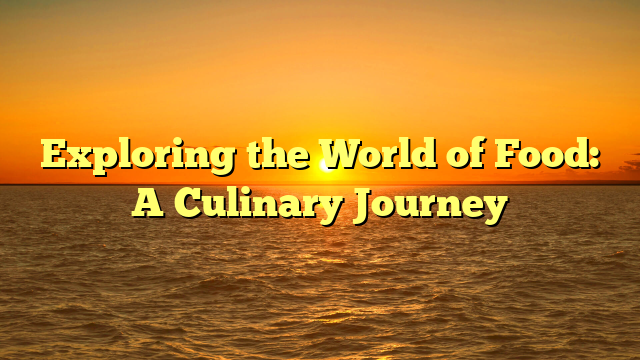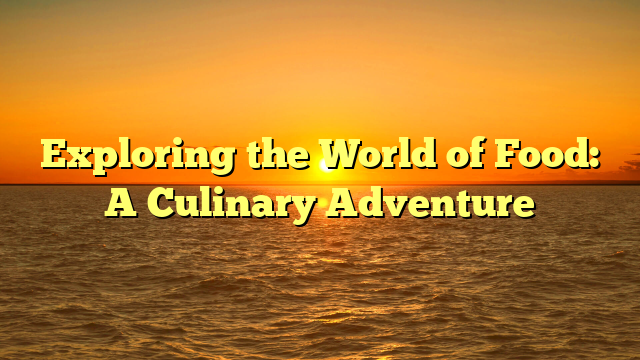
Food is much more than just a necessity for survival. It is a fundamental part of our culture, an essential aspect of our social lives, and an endless source of pleasure and creativity.
From the intricate spices of Indian cuisine to the simplicity of an Italian pasta dish, food has the unique ability to bring people together, evoke emotions, and tell stories about where we come from. This article explores the rich world of food, its significance in different cultures, and how it continues to shape our daily lives.
The Evolution of Food
The journey of food begins with the origin of agriculture, which revolutionized human societies. Early humans were hunters and gatherers, relying on nature for sustenance. However, as civilizations grew, so did the practice of farming. By cultivating crops and domesticating animals, people were able to settle in one place and build complex societies. The earliest forms of agriculture are believed to have started in the Fertile Crescent around 10,000 BCE.
With 4d came the development of cooking techniques. The discovery of fire and the ability to cook food changed the way humans interacted with their environment. Cooking allowed people to break down tougher, raw foods into digestible and flavorful meals, making it possible to access a wider variety of foods. Over time, this led to the birth of diverse culinary traditions, each influenced by geography, climate, and available resources.
The Importance of Food in Different Cultures
Food plays an integral role in cultures around the world. It is not only a means of sustenance but also a reflection of a community’s history, values, and way of life. For instance, in Japan, food is seen as an art form, with a focus on seasonality, simplicity, and presentation. The Japanese culinary philosophy of “shun” emphasizes eating foods that are in season, allowing the natural flavors of the ingredients to shine. Popular dishes like sushi, sashimi, and ramen are a testament to the sophistication of Japanese cuisine.
In contrast, Italian cuisine is centered around family, tradition, and fresh ingredients. Meals are often long, communal affairs, and food is a key part of socializing. Italian cuisine celebrates simple ingredients like tomatoes, olive oil, garlic, and basil, yet it elevates them to create flavorful and comforting dishes. Whether it’s a pizza margherita in Naples or a rich bowl of pasta in Rome, Italian food is all about connecting with others over a shared meal.
Meanwhile, in the Middle East, food is synonymous with hospitality and generosity. The region boasts a wide range of vibrant and flavorful dishes, such as hummus, falafel, tabbouleh, and kebabs. These dishes are often served in large platters, encouraging guests to share and bond over food. Spices such as cumin, coriander, and sumac are frequently used, adding depth and warmth to the cuisine.
In India, food is not just about taste, but also about the experience. Indian cuisine is known for its bold flavors, intricate spice blends, and regional diversity. Spices like turmeric, cardamom, cinnamon, and ginger are staples in Indian cooking, creating layers of flavor that
dance on the palate. From the fiery curries of the south to the fragrant biryanis of the north, Indian food tells the story of its diverse culture and long history of trade and migration.
The Role of Food in Health and Nutrition
Beyond cultural significance, food also plays a crucial role in our health. A balanced diet is essential for maintaining good health and preventing chronic diseases. The human body requires a variety of nutrients, including carbohydrates, proteins, fats, vitamins, and minerals, to function properly. A well-rounded diet ensures that the body has the energy and nutrients it needs for growth, repair, and daily activities.
In recent years, there has been a growing focus on the benefits of eating whole, unprocessed foods. These foods are rich in essential nutrients and tend to be lower in added sugars, unhealthy fats, and artificial ingredients. Whole grains, fresh vegetables, fruits, lean proteins, and healthy fats such as those found in nuts and olive oil are key components of a nutritious diet. These foods not only support physical health but also improve mental
well-being and energy levels.
However, the modern food environment poses challenges to healthy eating. Processed and fast foods, which are often high in calories, sodium, and unhealthy fats, have become widely accessible. This has contributed to an increase in obesity and lifestyle-related diseases such as diabetes and heart disease. As awareness about these health concerns grows, there is a push toward more sustainable and health-conscious eating habits. Plant-based diets, in particular, have gained popularity due to their positive impact on both personal health and the environment.
The Future of Food
The future of food is an exciting and dynamic topic, as technological advancements and sustainability concerns continue to shape the way we eat. Innovations in food production, such as lab-grown meat and plant-based alternatives, are revolutionizing the food industry. These alternatives provide a more sustainable way to meet the growing demand for protein while minimizing the environmental impact of traditional animal agriculture.
Another area of focus is the development of food security solutions. With the world’s population continuing to grow, ensuring that everyone has access to nutritious food is a critical issue. Vertical farming, which involves growing crops in stacked layers, and aquaponics, a sustainable method of farming that combines fish and plant cultivation, are examples of innovative approaches to food production. These methods offer the potential to grow food in urban areas and regions with limited arable land, making fresh produce more accessible.
The role of food in addressing climate change is also gaining attention. Sustainable farming practices, such as regenerative agriculture, focus on maintaining healthy soil and reducing the carbon footprint of food production. By adopting these practices, we can contribute to a healthier planet while also ensuring a more sustainable food supply for future generations.
Conclusion
Food is far more than a basic human need. It is a gateway to understanding the diverse cultures and traditions that shape our world. Whether it’s the rich, spicy dishes of India or the fresh, seasonal flavors of Japan, food reflects who we are and where we come from. In addition to its cultural significance, food plays a crucial role in our health and well-being, making it essential to prioritize nutrition and sustainability. As we look to the future, innovative solutions and a growing focus on sustainability will continue to transform the way we produce and consume food, ensuring that it remains a vital part of our lives for generations to come.




